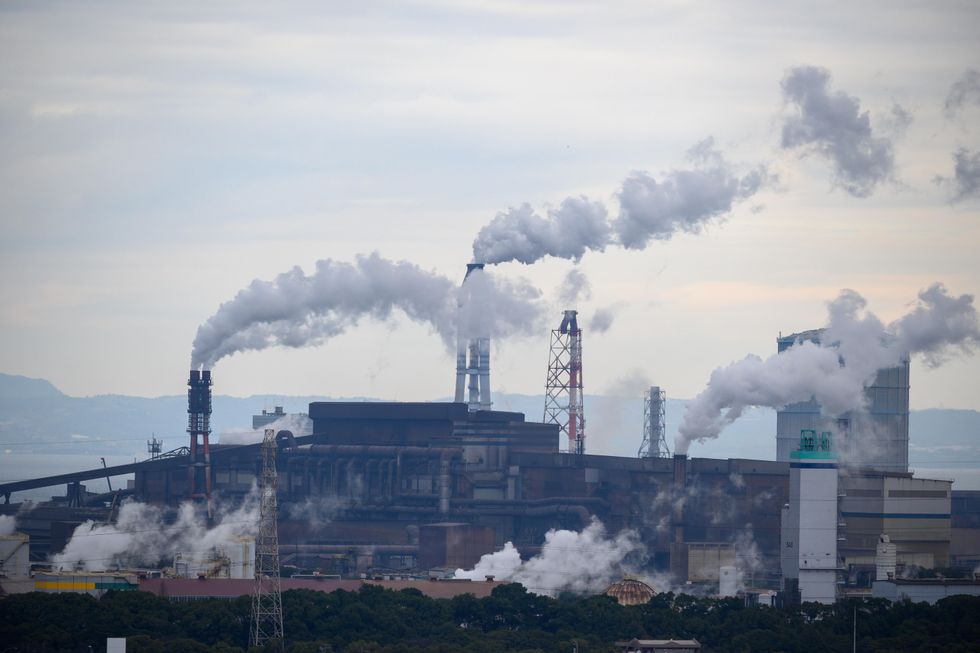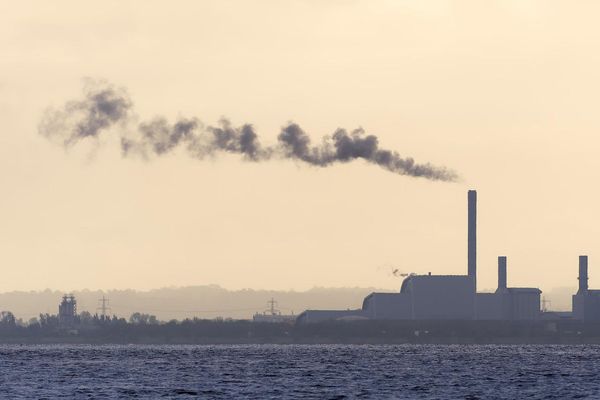climatepolitics
Appalachian groups express frustration over first $30 million in federal hydrogen hub funding
“This award represents a continued commitment to invest in a natural gas industry that has added to the pollution and health burdens in the region.”
PITTSBURGH — On July 31, the federal government announced $30 million of funding for the Appalachian Regional Clean Hydrogen Hub, or ARCH2, which plans to create hydrogen from natural gas and other sources.
ARCH2 is one of seven planned, federally funded hydrogen hubs across the country, and one of two (along with the Gulf Coast hub) that will rely primarily on fossil fuel sources rather than renewables to create hydrogen.
The $30 million award represents the first round of funding for ARCH2, with a total of $925 million available for this project over the next seven to twelve years. In total, the seven planned hydrogen hub projects are slated to receive $7 billion in federal funding.
The $30 million will be used to “solidify planning, development, and design activities around site selection, technology deployment, community benefits and engagement, labor partnerships, and workforce training,” according to the U.S. Department of Energy (DOE).
The announcement comes just weeks after Pennsylvania governor Josh Shapiro signed into law a controversial bill allowing carbon capture and storage in the state, which will be required for the development of the hydrogen hub.
The award announcement frustrated local environmental and community advocates, who say the DOE has not been transparent about the details of the project, its climate and economic benefits, or its potential to add pollution and cause health harms in environmental justice communities that are already overburdened with existing pollution sources.
“This award represents a continued commitment to invest in a natural gas industry that has added to the pollution and health burdens in the region while failing to deliver any measurable growth in jobs, income and population,” Sean O’Leary, senior researcher with the Ohio River Valley Institute, a progressive think tank, said in a statement.
Earlier this year, the Ohio River Valley Institute delivered a letter to the DOE on behalf of 54 Appalachian organizations and community groups calling for the suspension of ARCH2. The letter called on the DOE to release additional information about the projects and offer impacted communities more meaningful opportunities for engagement prior to awarding additional funds — neither of which has happened, according to the organizations that signed the letter.
“Affected communities know little about the proposed projects and their impacts,” the No False Solutions PA Coalition said in a separate statement about the award. “Nevertheless, millions of dollars are being awarded to projects that will surely impact our health and environment BEFORE affected communities have had a chance to weigh in.”
Critics of the ARCH2 project say that carbon capture and storage technology hasn’t yet proven effective as a climate solution and it remains unclear whether hydrogen energy will abate or worsen climate change.
“There’s been a lot of talk about how hydrogen will be a cleaner energy source, but that overlooks the entire picture which includes reliance on the natural gas industry, which we know pollutes and harms communities and drives climate change with methane leaks,” Talor Musil, a field manager with the Environmental Health Project, a public health nonprofit, told EHN.
The hydrogen money is here, just in time for the hype
In a conference filled to the brim with announcements, the U.S. Department of Energy used the occasion of the Global Clean Energy Action Forum in Pittsburgh to start the race for $7 billion in hydrogen funding.
Climate change in Pa.: More storm-driven power outages possible, analysis says
Peter Dykstra: Meet the Zeroes
Back in the day, even the climate-denying, drill-baby-drill zealots tried to maintain a saving green grace. Not anymore.
Once upon a time, environmentalists’ favorite villains always kept a pet green cause in their back pockets.
James G. Watt, Ronald Reagan’s pious, libertarian Interior Secretary, sought to lease every square inch of American coastline whether or not it bore potential for oil and gas. He also suggested that if environmental regulation could not be overcome with the ballot box, then the “cartridge box” awaited. But even Watt tipped his political hat to environmental values, endorsing a halt to global commercial whaling during a 1991 whale watch excursion.
Years later, Oklahoma Sen. Jim Inhofe was well on his way to establishing himself as the alpha dog of congressional climate deniers. But in 2004, he became champion of the endangered Kemp Ridley sea turtles, co-sponsoring a measure to protect their nesting grounds along the Gulf Coast.
But now, when the most basic environmental questions have turned brutally partisan, things have shifted. Conservatives no longer feel they need to put up a green show to keep appearances, according to the scores of the League of Conservation Voters (LCV), a half-century-old, non-partisan organization that tracks the behavior of congressional committees or individual congresspersons.
LCV bases its rating on key environmental votes in the House and Senate. What it shows is alarming.
That was then...
I looked at the 1990 Congress as a random year. Two senators and 23 House members rated a zero LCV score that year. Republican senators averaged 32%; Democrats, 65%. In the House, LCV gave the GOP a 40% average; the Dems scored 68% on average.
This is now...
Well, the zeroes actually haven’t grown by a lot: 33 House members and, in fact, none in the Senate. But, virtually every single Republican House and Senate member today is under 30%. Prominent among those with a 0% LCV score are several reps. whose outspoken-ness has raised eyebrows, like Rep. Marjorie Taylor Greene of Georgia, Paul Gosar of Arizona, and Lauren Boebert of Colorado.
Why this matters
To me it’s horrifying to see things coming to a head as they are this summer and America’s two political parties more polarized than ever. Marco Rubio, R-Fla., a senator with presidential dreams, is pulling a 5%, with his state barely five feet above rising seas. Presidential rival Ted Cruz, R-Texas, whose state has been ravaged by heat, drought and storms, is at 3%. Higher scorers like Rep. Liz Cheney, R-Wyo., at 30% are ending their careers, voluntarily or otherwise.
Hellacious wildfires and biblical downpours ought to be climate’s heralds, but these folks simply aren’t paying attention.
Peter Dykstra is our weekend editor and columnist and can be reached at pdykstra@ehn.org or @pdykstra.
His views do not necessarily represent those of Environmental Health News, The Daily Climate, or publisher Environmental Health Sciences.
Ruth Greenspan Bell: Wealth and the climate dilemma
Developing countries that increase their fossil fuel production are at a crossroads: securing their own long-term well-being or earning revenue to finance programs to support immediate economic growth.
Irony abounds as we close out a summer that brought the death of the climate truthteller, scientist James Lovelock, along with news that more countries in Africa and South America have decided to exploit, aggressively, their fossil fuel production – protected areas and former promises be damned.
The Democratic Republic of Congo, had, less than a year before at the annual climate negotiation in Glasgow, signed on to a 10-year agreement to protect its rainforest, part of the vast Congo Basin. In shifting to extraction, they seem to be saying, basically, everyone’s doing it; why not us?
Congo is not alone in this choice. In 2015, Guyana discovered off-shore oil reserves. More recently, it is sprinting to exploit at least 11 billion additional barrels of oil off its coast. Like Congo, Guyana’s leadership says it will use the proceeds to improve the lives of its people – in this case, infrastructure and health and education systems.
It’s hard to fault an impoverished country with no historical responsibility for the fast-accelerating climate crisis for wading in at this late date to exploit their fossil fuel resources. And it is clearly impertinent, at the minimum, for those of us who have led gilded privileged lives rooted in huge fossil fuel consumption to fault a country that has decided to try to leverage its natural resources to better the lives of its people.
And there lies the dilemma. Congo itself sets up the choice as between global interest and national-interest, between saving the planet and earning revenue to help an impoverished country finance programs to support economic growth.
Yes, revenues will increase and we can hope they will be spent wisely. At the same time, extraction feeds the beast that inevitably makes their own countries less livable. It lets the wealthy countries off the hook, supporting their continued extravagant energy consumption.
The missing factor in Congo’s calculation is that extraction itself is far from costless. It has profound, permanent domestic impacts. These are hard to manage in normal times and in affluent countries. In the increasingly challenging conditions of a changed climate, countries should be focused on how to sustain life in uncertain times, when they may be thrown on their own resources to survive.
Countries that host extraction must live with the detritus of extraction, which is by definition intrusive. Even responsible extraction of natural resources imposes environmental costs. Digging hydrocarbons disrupts the landscape in a variety of ways. Ground is broken and earth is moved. Roads and power transmission corridors are cut through pristine areas. Workers and often their families must be housed and provided attendant services. All of this produces waste which must be disposed of or trucked out.
The activity of building roads and then the use of those roads and equipment introduces fuels and exhaust fumes. Extraction operations often use hazardous chemicals. Sometimes companies cheat and use illegal chemicals rather than those considered appropriate and for which there are technologies to capture and clean or separate. Offshore drilling brings its own set of disruptions. On land and at sea, there are oil spills that contaminate soil and water and may cause devastating explosions and fires.
All of this wreaks havoc on natural systems, fracturing the complex web of ecological interactions and processes that strain to support local life and downstream communities and cities, especially agriculture. Water is unclean or more toxic or less available as natural flows and connections between water bodies are irreparably cut. It is these flows that are essential for sustaining life. When mining finally leaves, lost topsoil, vegetation and forest cover constitute a broken natural chain that is rarely restorable.
Some impacts are obvious and visual, for example table top removal to extract coal. Others are more difficult to track and comprehend. When pollution enters an ecosystem, it is often difficult to trace its source and attribute responsibility. This is true even in countries with vast resources, empowered citizens with the tools and legal recourse to play a watch-dog role and well-functioning systems of law.
Dr. Lovelock’s legacy is the knowledge that destroying the living organism that is Earth has huge costs. Extraction and the exploration that leads to it breaks communities, piece by piece. Deciding to engage in these activities now comes at a very bad time in the history of the Earth and of human kind's existence on it.
Of course, companies promise to clean up their mess. Experience tells us not to rely on such promises – not only because promises are broken but because much of this damage is irreparable. Reconciling extraction and protection of the environment is an ongoing challenge even in places with well-established regulatory systems. Look at West Virginia, albeit a different kind of extraction. Despite requirements that coal companies remediate, bankruptcies of coal giants like Peabody have thrown into doubt who is responsible for abandoned strip mines and denuded mountains. Impoverished countries will have even less leverage to manage the damage when the corporations leave.
As climate change fully hits vulnerable countries, heat will buckle roads and rail beds; erratic precipitation will make hydropower unreliable and make it harder to move product on water, much less to provide for domestic water needs. There comes a point where working in the heat is not just oppressive but fatal.
It would be a bold option for these countries to take control of their destinies. One way to do this is to reject extraction and adopt a self-protective plan shifting to more fundamental but sustainable endeavors. A tortoise rather than hare strategy better positioning them for the inevitable shift could range from diversifying into alternate energy sources to water harvesting, dry farming and building soil capacity to retain water. These are all techniques recommended for water-poor, stressed geographies such as Gaza. The inevitable changes on the horizon argue for making a virtue of what has been seen in the past as a liability — small scale survival.
In an ideal world, the wealthier countries would contribute to this strategy, but realistically, help at scale from abroad is unlikely. Countries at risk have pleaded for climate adaptation or compensation funds – some of which could in theory help with these kinds of transitions. In reality, what funds that exist are chronically underfunded and unreliable. Congo came out of Glasgow with such promises, which it clearly decided were not sufficient.
Is this advice realistic? Maybe not, but humanity is in uncharted waters, meanwhile trying to pretend that everything is manageable. The truth is: any big challenge requires political will. Sometimes survival is achieved by defying conventional wisdom.
These are not easy choices, but rejecting extraction would engage a very different vision of self-interest. And one that might be more appropriate for the disaster we find ourselves in.
Ruth Greenspan Bell is a Public Policy Scholar at the Woodrow Wilson International Center for Scholars in Washington, DC, and affiliated with The Environmental Law Institute. Her views do not necessarily represent those of Environmental Health News, The Daily Climate, or publisher Environmental Health Sciences.
What is environmental health?
Examining a massive influence on our health: the environment.
We've been reporting on environmental health for 20 years. But what is environmental health? You've got questions, and we have answers.
What is environmental health?
Environmental health is a branch of public health that monitors the relationship between human health and the environment, examining aspects of both our natural and man-made environment and their effect on human wellbeing.
What is an example of environmental health?

Environmental health is a broad area of study — everything from the climate to the food we eat to the air we breathe plays into environmental health. A few specific examples include:
- Air pollution: Living near factories or heavy traffic worsens air quality and leads to health impacts on the lungs and heart such as asthma and increased risk of heart attacks or stroke.
- Water contamination: Drinking lead-contaminated water can cause IQ loss, behavioral issues, learning disabilities and more. Infants and young children are most at risk.
- Toxic chemicals in consumer products: Phthalates, a class of chemicals that are widely used in consumer products, are known endocrine-disruptors, meaning they hijack your body’s hormones and can cause a wide array of health impacts including increased risk of cancer and fertility issues.
What is the role of environmental health?
The role of environmental health research is to examine areas of the environment that impact our health so that we can make personal and policy changes to keep ourselves safe and improve human health and wellbeing.
Why is environmental health important?

Environmental health impacts every one of us.
We reap the benefits of clean air, clean water, and healthy soil. If our environment is unhealthy, with toxic chemicals saturating our resources and pollution abundant, then our health also suffers.
It is also an important field of study because it looks at the “unseen” influences on your health.
Many individuals may not associate their health problems with air or water quality, or with what clothes they wear, makeup and household goods they use, or food they eat.
That’s because not every example of environmental health problems are obvious: some chemicals, for example, build up slowly over time in your body: a small dose may not seem to bring harm, but repeated small doses can lead to later impacts.
- BPA absorbed through plastic containers, cans, receipts, etc. lingers in the body and the build-up over time increases risk of cancer, diabetes, liver failure, and more.
- PFAS are known as ‘forever chemicals ’— they don’t break down and are widely used, so small exposures are frequent and contribute to immune system and reproductive damages, heightened cholesterol levels, and more.
- Mercury from eating seafood and shellfish can impact neurological development of fetuses in the womb, and populations that regularly consume mercury-heavy seafood have shown mild cognitive impairment.
Also, individual susceptibility can differ: for example, one member of a household can experience illness, asthma, migraines, etc. from chemicals found in their water supply while another member of the same household is just fine, such as the case in a young girl’s reaction to benzene in her water from living near fracking wells.
Certain variables play a role in susceptibility and level of adverse health effects such as age, gender, pregnancy, and underlying health conditions. Studies suggest fetuses, infants and children are much more at risk to experience lifelong health problems from toxic chemical exposure.
Rate, duration, and frequency of exposure to toxic chemicals and other influences from our environment all factor into our health.
Good environmental health = good human health.
What environmental health problems affect our health?

There are many environmental health issues that affect human health. These include:
Air pollution — nine out of 10 people currently breathe air that exceeds the World Health Organization’s guideline limits for air pollution worldwide. This mainly affects people in low and middle-income countries, but in the United States, people that live in cities, or near refineries or factories, are often affected as well.
Air pollution also ramps up during wildfire season.
Read more: Breathless: Pittsburgh's asthma epidemic and the fight to stop it
Water pollution — as of 2014, every year more people die from unsafe water than from all forms of violence, including war. Water is the ‘universal solvent’, meaning it can dissolve more substances than any other liquid on Earth. Thus, it is too easy for toxic chemicals to enter our water supply.
Read more: Sacred Water: Environmental justice in Indian Country
Lack of access to health care — yes, this is an environmental health issue! Having an accessible health care system is part of one’s environment. Difficulty getting health care can further impact one’s health.
Poor infrastructure — from “food deserts” to lack of transportation services, living in an area with poor infrastructure can impact your health.
Read more: Agents of Change: Amplifying neglected voices in environmental justice
Climate change — climate change-induced heat waves, increased frequency and severity of large storms, droughts, flooding, etc. have resulted in health problems and even death.
Chemical pollution — chemical pollution can be sneaky: the chemicals in your everyday products, from shampoo to deodorant to your clothing to the food you eat, can directly affect your health. These chemicals are often not on the label or regulated at all.
Read more: Exposed: How willful blindness keeps BPA on shelves and contaminating our bodies
How can we improve our environmental health?

Educate yourself. Environmental health is a broad topic, so this can seem overwhelming. Start by taking stock of your own personal environment. Look up air pollution monitoring in your area. Get your water tested to see its chemical makeup. Evaluate the products you use in your life — personal products like shampoo and deodorant, household cleaners, air fresheners, the foods that you eat — and see what you’re bringing into your home.
Explore the Environmental Working Group's guides to check your products for toxic chemicals.
We have additional guides to help you learn more about environmental health. Find guides to plastic pollution, environmental justice, glyphosate, BPA, PFAS and more in the Resources tab at the top of our website.
As individuals we have the power to improve some of our environmental health, but there is a pressing need for systemic change and regulation on a policy level.
We’re actively working with scientists to share their research and knowledge with politicians to advocate for science-backed policy change. But we need your help. Contact your representatives to let them know that environmental health is important to you — whether it’s air pollution in your area, contaminated water, plastic pollution, food deserts in your area, or chemicals in consumer products.
Subscribe to Above the Fold, our daily newsletter keeping you up-to-date on environmental health news.
Poll: 75% of Pennsylvanians accept evidence of climate change
A new statewide poll shows three quarters of Pennsylvanians accept that global warming is happening.










